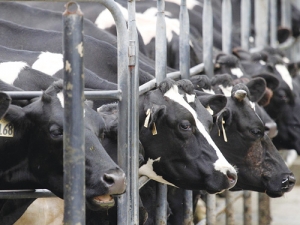Federated Farmers Dairy chairman Andrew Hoggard spoke at the annual conference in Wellington last month. Here are excerpts from the speech.
Another season has gone by and whilst positive noises are sounding about potential market improvements, the prices we all face are still below the breakeven point for many of us. The expectation is that the financial implications of this downturn will see us in pain for a few years to come.
Much of the commentary in the past few days has been on the Brexit and the fallout from it. One might ask, what does this mean for New Zealand dairy? It is all up in the air at the moment, given that our exports to the UK are minimal. Whilst we have quota, the tariff rates make our product uncompetitive against cheaper imports from Ireland and the Netherlands.
If we were able to quickly organise trading terms with the UK on the same level as the EU, then we would have good opportunity. Under WTO rules existing agreed access can't be downgraded. However, on the downside we have now lost an ally from the EU table, one that could have negotiated a free trade deal with the EU. With all the global uncertainty this may have a negative impact on global demand.
The economic fallout is interesting because it shows the impact caused by trade barriers. All this panic is being caused by the UK's intention to leave the free trade area of the EU; it is not because they are leaving behind the red tape, bureaucracy, regulations, various common policies, and the fact need to have one's passport stamped when travellling between the UK and the rest of Europe. Let's face it, if there had been more effort globally at the WTO, and a better setting globally for trade, would this be such a big deal? One hope I have is that this will result in more focus on the WTO, which can only be good for us.
The sharemilking system unique to New Zealand has served our industry well, allowing progression and giving our industry access to innovative and fresh thinking. While many other dairy industries worldwide have complained that they struggle to attract the younger generation, here sharemilking has provided the means for progression and succession in our industry.
The current climate has seen a number of sharemilkers leave. It is not because they are poor farmers; many will be very good farmers, but timing has not been in their favour. Whilst there is the adage that one person's loss is another person's opportunity, we need to recognise we don't want a situation where we lose too many of the next generation.
We need to ensure our sharemilking system is robust enough to handle the volatility we are experiencing right now. There needs to be flexibility to ensure that during the poor times the hardship is evenly balanced, and during good times the gain is also balanced appropriately.
We have had a lot of talk about system change on our farms. Much of that talk is about going back to all grass. But is the message DairyNZ is giving out the same as the farmers are hearing? Is something 'lost in translation'; does maximising your pasture usage mean 'all grass'?
We may also need to consider debt levels on NZ dairy farms. Compared to other countries we carry very high debt. There are several causes: in many cases farmers in other countries haven't been able to expand because of regulations, thus they haven't needed to borrow; or they have experienced volatility from other quarters, such as weather in Australia, which means they have a fixation about managing that and so carry less debt.
Is this current downturn just a blip, or are we entering a new period? Things might look slightly different than the last decade Will this mean we need to re-evaluate what a smart level of debt is? These are the questions farmers should be asking themselves.











